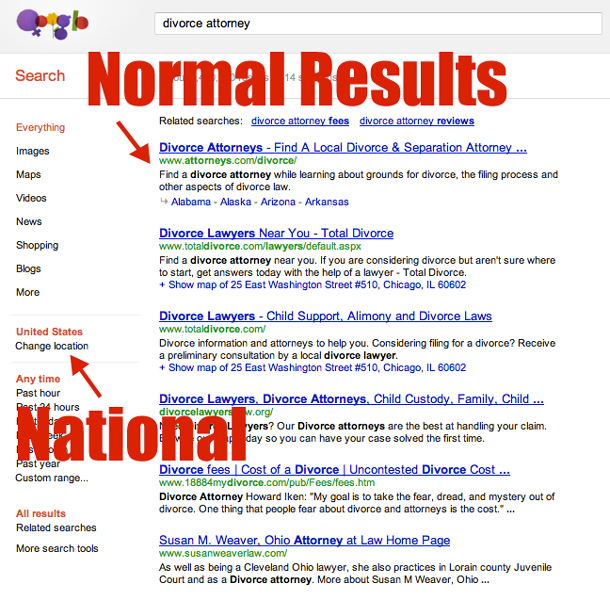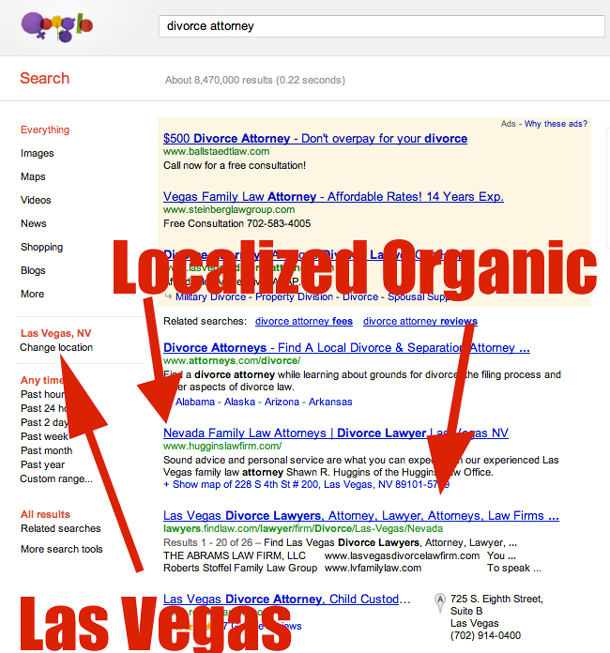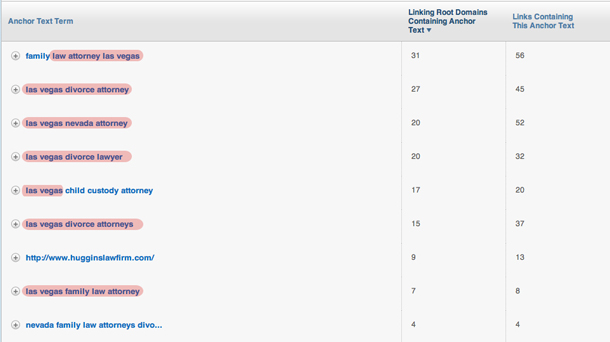The Brand of SEO and the Trend of Inbound Marketing |
| The Brand of SEO and the Trend of Inbound Marketing Posted: 12 Mar 2012 02:08 PM PDT Posted by randfish The web marketing community, and specifically many folks in the search field have recently been engaging in lots of conversations about the industry's nomenclature. I think these discussions are excellent to have and I'm glad we're openly communicating with one another on the topic. If there's to be a shift or a progression in how online marketers focused on non-paid channels describe themselves and their work, I believe rigorous debate is a great starting point. And, as part of that belief, I want to share my views on the topic.
To say I'm a raving, fanatical, lunatic SEO evangelist is putting it mildly. But over the past 3 years, I've been gradually coming around to the viewpoint that in spite of my personal adoration for all things organic search, the outside world of marketing departments, startups, small-medium businesses and individual consumers doesn't see it that way. Last night, a startup friend of mine was over, reviewing a slide deck I'm building for another round of fundraising pain, when he received a spam email trying to buy some links on his site. "Ha. You SEO guys never quit do you?" Then today, in an interview with a candidate, I asked her about her background in SEO and she replied, "I told my husband about SEOmoz and he said 'SEO company? Watch out, those guys are spammy and untrustworthy." We talked through it, of course, but if you're in the field, you surely encounter this feedback daily, too. There's the problem. No matter how many cities I fly to, or times I evangelize the great things SEO can do, no matter how many blog posts or retweets or guest articles, it will always carry with it the taint of manipulation and inauthenticity. Even from those who know better. Even from those who've invested in SEO. And always, always from the mainstream and tech media. So what's to be done? Should we give up using the acronym? Perhaps shift to something like "get found online," "search engine visibility" or "content optimization?" In my opinion, those aren't real options. SEO is an established practice and it's an established, descriptive term. For millions of people around the world, it carries the accurate meaning - the practice of improving a brand's visibility in and traffic from search engines. That meaning may be negatively tarnished by frustrating and inaccurate brand sentiments, but even if we could shift to a new phrase, this new moniker would undoubtedly attract the same sorts of bad actors who cloud SEO's perception today. For better or worse, SEO is here to stay. But I'm not blind to the emerging reality: a shift in terminology is accompanying the growth in responsibilities of professional SEOs. I did some simplistic LinkedIn research recently that's illustrated below: That figure above shows overlap between these various fields and skillsets, and it's my opinion that we're going to see considerably more overlap between them in the years to come. To be an effective social media marketer, you must understand content, analytics and SEO. To be a great SEO, you need social media, content marketing, analytics and CRO skills. The "specialist/generalist marketers" - those who excel at a particular facet but have competence in all of them - are best poised to win in the upcoming decade of marketing. We need a way to describe this combination - it's simply too cumbersome and not descriptive enough to say one's job is: "Content creation, combined with investments in both the technical and outreach-based tactics in channels such as organic search, social networks, blogs and other websites, measured through analytics and tuned with conversion rate optimization." That's a mouthful, but it's getting to be a more and more common mouthful, because this process needs to be explained! Some say "SEO" already encompasses these:
Hence, we need a term/phrase that accurately describes this combination (but is not "Internet Marketing" since that phrase encompasses vastly more than what we're trying to get across, paid channels in particular). I've been a personal fan of the concept behind Inbound Marketing for a long time - that we should earn our customers' attention rather than interrupting them by buying it. I gave a talk about inbound for startups last December in Silicon Valley:
If you skip to 7:05 or so in the video, you can see the start of my talk, one of the better ones I've given in the past year. I recognize that not everyone in the marketing and search field feels as positive as I do toward the phrase "inbound marketing." But, I am seeing nearly everyone adopt the principles behind it, which include:
I asked on Twitter last week about alternatives to "inbound marketing" that still mean the same thing - narrow enough to exclusively focus on free channels of web-based customer acquisition (which terms like "Internet marketing" or "digital marketing" wouldn't), yet broad enough to include the items mentioned above. Two other suggestions seemed widely-adopted enough to consider: "earned media" and "organic marketing." I ran a comparison of these across several services: That chart above compares keyword searches on LinkedIn, SimplyHired, Google News, Google's AdWords Tool (for exact matches) and Topsy's Analytics. To be fair, all of these trail behind the individual tactics like "SEO," "social media," or "blogging," (as I noted above, they're not meant to replace those terms, but rather to explain the marketing practice that combines them). Inbound is clearly many steps ahead of the other two, though "earned media" has a lot of traction in the c-suites of large enterprises and publishers. Even if inbound marketing isn't the term that wins the lexicon battle, I believe the principles behind it are sound. They work. And they earn outsized returns to investments in most paid marketing channels or myopically singular investments on search, social or content alone. That's a message I've been working to refine and spread for some time now. Many of you reading this blog likely know that I started a personal project with my friend Dharmesh (from Onstartups & Hubspot) called Inbound.org. It's a site that seeks to highlight some of the best content around the marketing world. Along with that, I'm putting more effort into broadening my expertise in fields like content marketing, social media, CRO and PR, and when I talk about it publicly, I call it inbound marketing. Many other organizations, from software firms like Wordstream and Optify to agencies like TrustE, Weidert, Kuno Creative and Volinsky to blogs like Distilled, Kiss Metrics and Search Engine Land are using this language, too. I wouldn't say the terminology has overwhelming adoption, nor that it's necessarily won the market, but I would argue that the concept and principles are unstoppable and need a name. I don't think explaining that SEO means a bunch of other non-search-engine-related marketing practices is viable, nor do I think it's practical to explain the full concept every time you want to refer to it. SEO, in my opinion, isn't going anywhere, but it has tactical allies today that didn't exist 5 years ago, and I hope that some terminology encompassing these techniques takes root. As always, I'm looking forward to your thoughts on the trends of marketers focused on inbound/organic/free channels and the emerging use of "inbound marketing," itself. I'll do my best to contribute to the discussion in the comments, too :-) Sign up for The Moz Top 10, a semimonthly mailer updating you on the top ten hottest pieces of SEO news, tips, and rad links uncovered by the Moz team. Think of it as your exclusive digest of stuff you don't have time to hunt down but want to read! |
| Understand and Rock the Google Venice Update Posted: 12 Mar 2012 05:31 AM PDT Posted by NiftyMarketing This post was originally in YouMoz, and was promoted to the main blog because it provides great value and interest to our community. The author's views are entirely his or her own and may not reflect the views of SEOmoz, Inc. I am slightly shocked and simply amused that the recent Google Venice Update has largely flown under the radar. The Inside Search Blog published a list of 40 some-odd changes to the algorithm for February, and it seems that Panda 3.3 and the mysterious one liner about link valuation captivated most of the SEO and Inbound world, but what caught my local attention was this… “Improvements to ranking for local search results. [launch codename “Venice”] This improvement improves the triggering of Local Universal results by relying more on the ranking of our main search results as a signal. "Improved local results. We launched a new system to find results from a user’s city more reliably. Now we’re better able to detect when both queries and documents are local to the user." The UpdateSimply put, the Venice update localized organic results on broad search queries. Got that? If not, here are some examples… The Results Search “Divorce Attorney” with location set to United States. Search “Divorce Attorney” with location set to Las Vegas. Search “Divorce Lawyer” with location set to Chicago.
I know what you're thinking…. “Of course they did that on the term divorce lawyer. It’s a super localized search phrase. Unless a person has spouses in multiple states that is.”
But look at this SEO search query… It is clear that finally 2012 can be declared the year of local. With Google Places localized results + Google Organic Localized results every company needs a localized plan weather you have a single location, multiple location…or no locations at all because the national SERPS just got a lot more crowded. The PlanStep 1: Analyze the localized results on your queries.A wise man once said, “If you can’t beat em, join em.” This is my favorite applicable SEO quote as generally the people who are outranking you are doing something that you SHOULD be doing. This is definitely the case with the Venice update. Here are the common elements that I see these localized sites have…
http://lawyers.findlaw.com/lawyer/firm/Divorce/Las-Vegas/Nevada
Not exactly the most “natural” looking link profile but extremely effective in beating the localized filter in this case. A large percentage of the links have the term “Las Vegas” listed and for small sites that don’t have the overall authority of large sites, this seems to be the common trend. Step 2: Do way more than the competition. There is a common trend with companies that do well in the SERP rankings...they do more than the competition. These tactics will help you go above and beyond....
Here are some ideas: 1. Location based reviews – Instead of one testimonial site wide add a testimonial in every market you can. It helps to sell the “locationalism” to the searcher and it’s content that doesn’t have to be written by you… just gathered. 2. Gather “Why I love my city” user generated content – Ask customers to write up information about their local city and why they like it. It’s unique and fun to read. 3. Write out directions to each location – Have you ever heard people tell directions the same way? No chance of duplicate content with directions…ever.
1. Microsites: Build microsites for the submarkets of a large city. Put detail into making these sites unique and useful though small. Focus your link building efforts at these sites and then use brand + location + keyword targeted anchor text pointing back at your main site. This approach gets you authoritative links from sites that are in the same business and market that you are...and you own the site. 2. Local Guest Posting: Find hyperlocal blogs in your city. They are usually desperate for good content from locals. You don’t necessarily have to write about your industry though it would be nice to have the information semi-related. The main thing is using the author box to let people know you are a “location + keyword”. Step 3: Follow some Locals…Both of these lists contain top experts in the local search field. I know most of these people personally and vouch for them and their expertise in dealing with geo search tactics. The Local Search ecosystem is a different way of thinking so please take time to check out these lists and get on the radar of these localholics. The Google Venice update should ultimately change the way SEOs think about reaching searchers and a localized national approach to organic traffic will need to merge. Is this approach new? No, it's common sense longtail SEO that has been separating the "diggers" from "pickers" for many years. The difference now is that the surface is getting bare and the gold that is left is all underground. Happy digging. Sign up for The Moz Top 10, a semimonthly mailer updating you on the top ten hottest pieces of SEO news, tips, and rad links uncovered by the Moz team. Think of it as your exclusive digest of stuff you don't have time to hunt down but want to read! |
| You are subscribed to email updates from SEOmoz Daily SEO Blog To stop receiving these emails, you may unsubscribe now. | Email delivery powered by Google |
| Google Inc., 20 West Kinzie, Chicago IL USA 60610 | |


.gif)























